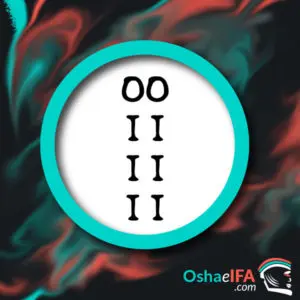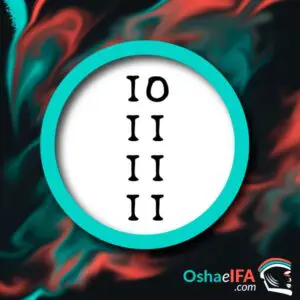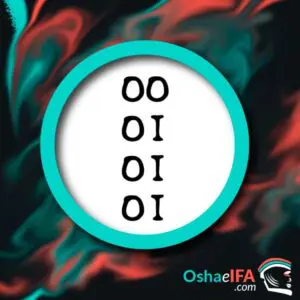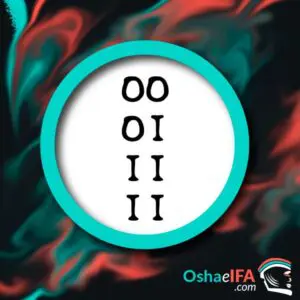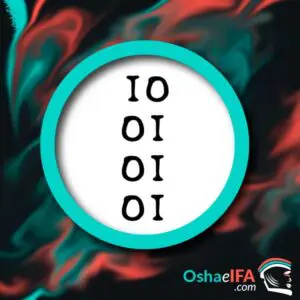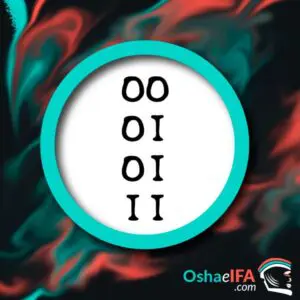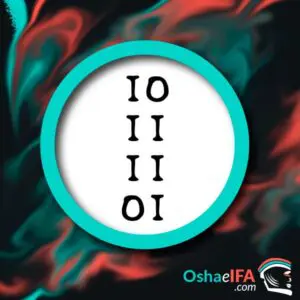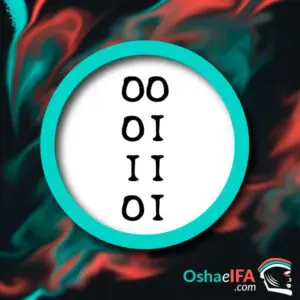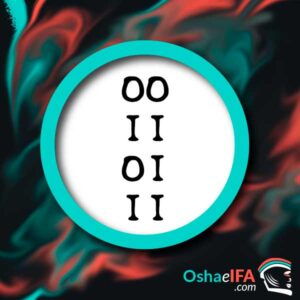Osa Ure (Osa Otura)
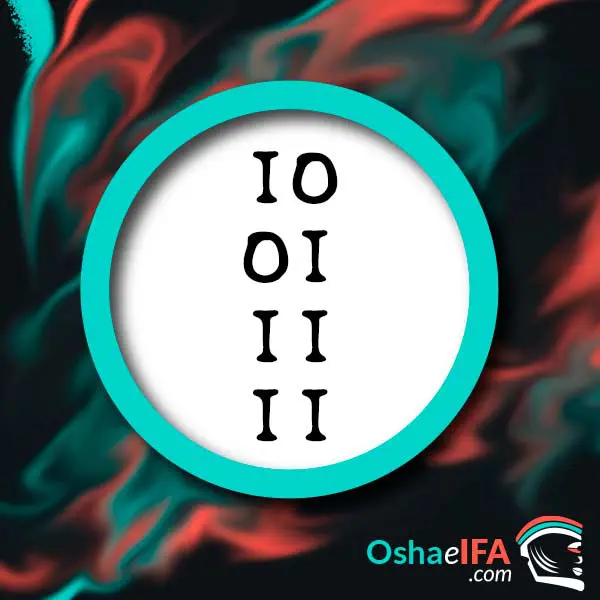
Osa Otura (Osa Ure), is Odu number 163 in the Ifá hierarchy, reveals that Obatalá, through the butter trade, fed his children, ensuring their prosperity despite staining himself with grease. This symbolizes the immense sacrifice of parents for the well-being of their children. For prosperity, sixteen wicks are lit with butter for Obatalá along with an Adimú.
Description of the Ifa Osa Otura Sign
Names or Aliases:
- Otura Bear.
- Ursa Ure.
- Eure Bear.
- Bear Tura.
- Osa Etura.
What is born in the odu of Ifá Osa Ure?
- Let the ashé pass through your head.
- The gonorrhea.
- Turquoise (precious stone).
- The sacrifice of the mother for the children.
- That death ate human flesh.
- Here: Eshu (Elegua) was indecent, because he showed his parts.
- The godfather does not make Ebó for the godson because he is late.
- The slave died free.
- You don't eat bananas or meat.
What does the Ifá sign Osa Ure talk about?
- Sage speaks.
- Yemayá Mayelewo, Ayalua and Ogede speak.
- The termite and the termite speak.
- Here: He talks about the descent to the Earth of Oshanla.
- Oyá is the one who kills.
- Obatalá exchanged gold for silver.
What does the Ifá Osa Otura sign mark?
- The herbs are: coralillo, sage, croto, curujey, jagua, alaba grass.
- The diseases are diseases of the bones, heart disease, transmission of venereal diseases, respiratory system, impotence, inflammation of the genital organs.
- It is seen to kill a person with a stab.
- You cannot have caged birds.
Analysis and reflection of the Odu Osa Ure (Osa Otura)
In Osa Otura, Ifa tells us about the need to face our problems, those that we often prefer to avoid, reminding us that in the honest and direct confrontation of our fears and difficulties, we find true liberation and growth. This Odu invites us to reflect on our actions and their consequences, warning us of the danger of ignoring the uncomfortable truths and the vital lessons they contain.
Economic Aspects
Economically, Osa Otura warns about the volatility and sudden changes that may arise. The teaching of "You have so much, you are worth so much" reminds us of the importance of generosity and humility in times of abundance, as well as prudence and thrift in times of scarcity. This sign encourages us to seek stability not only through material accumulation, but also by strengthening our values and our integrity.
"Salud"
Health under this Odu is particularly affected by bone problems and possible venereal diseases. Caution in intimate relationships and care for the skeletal system are crucial. Osa Otura suggests a return to nature, to herbs and ancestral remedies, as forms of prevention and healing, highlighting the importance of listening to our body and attending to its needs with respect and care.
Religious Aspects
Religiously, this sign emphasizes the importance of obedience and sacrifice, not as acts of submission, but as expressions of faith and commitment to our beliefs. The mother's sacrifice for her children and obedience to Ifá tell us about the depth of our bond with the divine and how this is reflected in our actions and decisions. The relationship with the Orishas, especially with Obatalá and Eshu, reminds us of the power of personal transformation through spiritual practice and respect for elders.
Personal Relationships (Love)
In love, Osa Otura warns us of the dangers of dishonesty, both towards ourselves and towards others. Eshu's indecency, in this context, symbolizes the consequences of indiscretion and disrespect in intimate relationships.
Sayings of the Sign of Ifá Osa Ure:
- He who gives what he has stays to ask.
- The much you have, the much you worth; You have nothing, you are worth nothing.
- The more you look, the less you see.
- We know the things of our destiny, but when we arrive on Earth we are impatient.
- When we speak the truth, God favors us.
- By avoiding the problems we face, they will not be solved.
- Sincerity in a man makes him great.
"By avoiding the problems we face, they will not be solved" It reminds us of the importance of facing challenges directly. Avoiding difficulties only postpones the solution, while addressing them contributes to personal growth and effective resolution.
Ifá ethical code of the odu Osa Eure (Otura):
- The much you have, the much you worth; You have nothing, you are worth nothing.
You may also be interested: Obatalá, source of light and clarity, orisha of serenity and Peace
Recommendations of the Osa Ure Ifá Sign:
In Osa Ure, it is highlighted that God favors those who tell the truth. The person will face a problem that he has been avoiding. This Odu teaches that "You have so much, you are worth so much" and "He who gives what he has to ask for stays."
In this context, Obatalá changed gold for silver, suggesting that the person could experience unfavorable changes in their life. Eshu, for disobeying Ifá, suffers from inflammation in his member, which warns of problems related to venereal diseases, including gonorrhea, a sexually transmitted infection characterized by pain, burning and mucopurulent discharge, which requires treatment to avoid chronic complications.
Termites and termites are also mentioned, indicating bone and cardiovascular problems. It is recommended to perform specific rituals for the heart, which include ingredients such as beef heart and white cuaba leaves.
To protect yourself, it is suggested to powder the teats from the udder of a goat offered to Obatalá and apply it to the mouth and forehead. In addition, two white roosters must be offered to Shangó and Egún, as well as six green bananas.
To ward off death (Iku), a suckling goat is given to Ogún behind the door. It is crucial to offer a goat to Oyá to preserve the person's life and avoid getting involved in the destruction of other people's homes, which could be fatal.
For women, excess and unrestrained sexual behavior can lead to family rejection and desires to distance themselves to avoid shame. This Odu reveals three paths: illness, unrest and happiness. Obedience leads to happiness, while disobedience leads to unrest and illness.
In addition, it warns about the danger of knives or firearms and physical altercations. The maternal blessing is fundamental; The mother always seeks the best for her son, even sacrificing herself for him. It is vital not to cause her worries and treat her with the utmost respect.
Meaning of the Oddun Osa Otura:
- Here, the godfather should not make Ebó to the godson with this Odu, because he will lose his luck. Another Awó must do it.
- The herbs of Osa Otura are: coralillo, sage, croto, curujey, jagua, alaba grass.
- Here turquoise (precious stone) was born. This Odu has a close relationship with the Odu Ogbe-Tuanilara, since Osa-Eure gives it the virtue of the magic of precious stones. Therefore, the person with this Odu must have his Orunmila necklace with a blue stone and a ring with a blue stone, so that the light of truth always shines in him and in his land.
- In this Ifá, in the Agutan Dishe land, Obatalá asked the dead man for food and a sheep had to be given to Orun hanging by his legs.
- In this Oddun, to improve luck, Eshu is given parrot feathers.
- Yemayá Mayelewo, Ayalua and Ogede speak here.
- Here the person must receive money. He also has a son he doesn't know. Put a bunch of banana in Shangó.
- This Odu says that in order for you not to fail, you cannot trust anyone.
- The person is a bit wasteful. He will have to take a little more care of his affairs, which are not very secure, although at the present they are very fruitful.
- Here the person has to do Santo.
- Luck comes to him through a son/daughter of Oshun; Take good care of him/her and ensure that he/she does Saint.
- The person will have to shake his head frequently. There are people who fight to destroy their house; attend to Orunmila and the Oshas.
- Osa Ure talks about disobedience with the Saint. You have to be careful lest when all your things are arranged, you die.
- It cannot be neglected.
- Through this Odu, you must receive Osun of extension and receive Ifá.
Ifa says in the Oddun Osa Ure:
- Be careful when walking, as witchcraft has been placed in your path that could affect your employment.
- It is essential that you receive Osun to protect yourself from negative energies in your work environment.
- A woman who appreciates him wants to help him by knowing his feelings and situations.
- You suffer from a curse that affects your sexual health, causing insomnia and inflammation of the genital organs.
- He considers moving because of the bad luck he attributes to his current residence, but the real problem is his indecision and lack of attention to advice.
- You will soon receive a significant amount of money.
- Your behavior is causing harm to another person.
- He has an unrecognized son; It is important that you know it.
- Offer a bunch of bananas to Shango to avoid failure and do not blindly trust others.
- It is necessary that you start in religion and become a Saint for your spiritual protection.
- Disobedience to saints and spiritual guides is marked in this Ifá.
- He must offer a goat to Ogún to keep death away from his door.
- "He who gives what he wants stays" indicates the importance of prudence in resource management.
- Avoid sharing too much; Keep your business and personal affairs private.
- Do not eat food or drink in unknown places to avoid being poisoned.
- Fortune is approaching; be prepared to receive it.
- Obatalá offers him protection; It is crucial that he perform spiritual cleansing.
- Clearing your head is vital to your spiritual and mental well-being.
- Before spending unexpected money, perform an Ebó to ensure your good fortune.
- Be careful with weapons and physical conflict situations.
Prayer of the sign Osa Ure Ifa:
OSA URE KUYE JURE ADIFAFUN ELEGBARA AFETIFE OBEAYAWO OBINI
PELURE OKAN KOMI SHESI EBO OPON ARO OKELAKUEN KAFEREFUN
ORUNMILA KAFEREFUN OBATALA ODE OGUN ORUNMILA YALORDE ATI
SHANGO.
Suyere Osa Otura:
OSANA OSA NANA OMOLUPAO, EWE NI LERI KE TUTU,
EWE ASANA OMOLUPAO, EWE ASANA OSA KANA OMOLUPAO,
EWE ASANA OMOLUPAO
Ebboses (Works) of Odu Osa Ure:
Ebbo of Odu Osa Otura so that Shangó grants money:
To make this ébbo, you need: a rooster, flour mixed with okra, six green plantains, jutía and smoked fish, among other ingredients, and a significant amount of money.
The bananas must be cut into slices along with their peel and offered to Shangó in a tray. The tips of the six bananas are reserved for the ébbo.
Osa Otura's work to prolong life:
If the person does not have Oyá, they must take a small stone from the cemetery. On a white plate, nine red circles are drawn and, in the center of the first circle, the stone is placed along with the person's hair and pieces of the person's sweat-soaked clothing. On the ground, a circle is drawn with husk, and inside is Oyá or, failing that, the dish prepared according to Odu Isalayé. Nine candles are arranged around it, and to the right of Oyá or the plate, nine pieces of coconut spread with corojo butter are placed.
Obi Omi Tutu (fresh coconut) is offered to Oyá, explaining the purpose of the ritual and consulting how many days the assembly should remain and which path to follow. Then, the candles are lit.
You may also be interested: Ifa Oshe Di sign
Pataki of the sign of Ifa Osa Ure:
Obatalá's goat.
Obatalá had a goat that he loved very much because she was good and obedient. However, over time, she got together with other animals and changed her behavior in such a way that Obatalá could no longer stand her, since she did not obey and ran away to the street when she wanted.
One day, Obatalá sent for Ogún and instructed him to prepare to, in his order, sacrifice the goat. Ogún, feeling compassion for the goat, went to look for her and informed her about her situation, recommending that she consult with Orunmila to save her life.
Following the advice, the goat visited Orunmila, who, after performing the Osode, identified the Odu Osa Eure and warned him that he needed to pray his head and do Ebó to avoid his death. The goat performed the prayer head on but neglected to do the Ebó, and after a while, her behavior worsened.
Tired of his behavior, Obatalá called Ogún and ordered him to bring the goat, telling him that he was going to organize a party. Ogún brought the goat to Obatalá, and when she asked what would be served for food at the party, Obatalá responded: "What I am going to give is goat."
Thus, Ogún had no choice but to comply with the order to sacrifice the goat.
Explanation: History teaches us the importance of obedience and the consequences of ignoring warnings and opportunities for amendment. The goat had the chance to change her destiny, but by not completely following the advice given, she faced a tragic end. This reminds us that actions and decisions have repercussions and that negligence can lead to irreparable consequences.
You may also be interested: Oddun from Ifa Otura Sa
Oddun of Ifa Osa Ure Ifa Traditional
ÒSÁ ÒTÚRÁ
Ohun eni ò nií nu ni
Kóhun or nu ni
A day fún Somúrógé you are alárá
Ohun eni ò nií nu ni
Kóhùn or nu ni
A day fún Sòkùndìgbà you are Ajerò
Ohun eni ò nií nu ni
Kóhùn or nu ni
A day fún Somúlùké
Omo Owárángún ága
Ebo n won ni won or se
Àwon métèèta ni ón pé oko ìmònràn làwón ó nìi ntàwon
Ení or bá le moóko àwon
N làwón or fèé
Alárá so tiení Somúrógé
Ajerò so tiení Sòkùndìgbà
Owáràngún àgá so tiení Somúlùké
Won bá dàgbà dàgbà
Wón tú ilé okóó lo
Òrúnmìlà ní òun wáá le moóko won báyìí?
Wón ní kó rbo
Wón ní kó tújú Awo èkuru funfun méta
Kó lòó gbé métèèta kalè
Lójú ònà odò tí ón gbé n lòó ponmi
Kó wáá go Sínú Igbó
Légbèé ebo to ru
Òrúnmìlà béè
Èyí tú saájú ló kókó rí Awo nlè
Ó ní Somúrógé as Alárá
O ò waá wo nnkan
Òrúnmìlà moóko èèkejì
Somúrógé bá ké si èèketa
Sòkùndígbà as Ajerò
O ò waá wo nnkan
Somúlùké omo Owáràngún àga ló sì rí àwon àwo nlè
Àwon méjèèjì yòókù bá ni
Somúlùké omo Owárángún àga
Jé kí àwón ó gbé kinní yìí lókòòkan káwon ó je é
Wón bá gbé àwo lókòòkan
Wón go down hee
Won je gbogbo è tán
ni on ba fo awo
Kí wón or moó lo
Òrúnmìlà bá pè won padà
Ó lóhun eni ò níí nu ni kóhùn ó nu ni
A day fún Somúrógé you are alárá
Ohun eni or nií un ni kóhùn or nu ni
A day fún Sòkùndìgbà you are Ajerò
Ohun eni or níí nu ni kóhùn or nu ni
A díá fún Somúlùké you are like Owáràngún àga
Màtàìdé onbù
oní lábá owó
Omo Alárá fún my láwoò my ò
Ohun eni or níí nu ni kóhùn or nu ni
Omo Ajerò fún my láwoò my ò
Ohun eni or níí nu ni kóhùn or nu ni
Omo Owárángún àga fùn mi láwoò mi ò
Ohun eni or níí nu ni kóhùn or nu ni
I somúrógé as Alárá fún my láwoò my ò
Ó lóhun eni ò níí nu ni kóhùn ó nu ni
Sòkùndìgbà omo Ajerò fun mi láwoò mi
Ohun eni or níí nu ni kóhùn or nu ni
Somúlùké omo Owáràngún àga funn mi láwoò mi ò
Ohun eni or níí nu ni kóhùn or nu ni
Àwon métèèta bá ní ó móo kálo òdòo baba àwon
Wón dé òdò babaa won
won kejo; won ro
Allah ní Òrúnmìlà
Ògún òké rèé ohun àwoò re ò
Ohun eni or níí nu ni kóhùn or nu ni
Òrúnmìlà logún òké ò asiun àwo òun ò
Ohun eni or níí nu ni kóhùn or nu ni
Kín ló wáá túhun àwoò re ò
Ohun eni or níí nu ni kóhùn or nu ni
Odidi ènìyàn lótóhun àwoò mì ò
Ohun eni or níí nu ni kóhùn or nu ni
Alárá ba pe Somúrógé
Ó lóó gbó báyíí?
Ó ní móo ba a lo
Wón de òdò Ajerò
Ajerò bèèrè ejó
Bóo ló ti laugh?
Won ni too
Èkuru lawon je tan
Ni àwón bá fó àwo è
Ló bá sì pé kí àwón ó fún òun láwo mina
Ajerò bá mú Ogbòn òké
Òrúnmìlà Ogbòn òké rèé ohun àwoò re ò
Ohun eni or níí nu ni kóhùn or nu ni
Òrúnmìlà logbòn òké ò túhun àwo òun o
Ohun eni or níí nu ni kóhùn or nu ni
Kín ló wáá túhun àwoò re ò
Ohun eni or níí nu ni kóhùn or nu ni
Odidi ènìyàn lótóhun àwoò mi ò
Ohun eni or níí nu ni kóhùn or nu ni
Ajerò ní ò ò gbó báyìí?
Ìwò Sòkùndìgbà móo ba Òrúnmìlà lo
Wón bá korí Sílé Owáràngún àga
Hey you drool Somúlùké
Ngbàa won dódòo baba è
Wón kéjó won tún rò
Òún àádóta òké rèé ohun àwoò re ò
Ohun eni or níí nu ni kóhùn or nu ni
Òrúnmìlà ní àádóta òké ò túhun àwo òun ò
Ohun eni or níí nu ni kóhùn or nu ni
Owáràngún àgá ní kín ló wáá túhun àwoò rè ò
Ohun eni or níí nu ni kóhùn or nu ni
Odidi ènìyàn lótóhun àwoò mi ò
Ohun eni or níí nu ni kóhùn or nu ni
Owáràngún àgá bá pé omoo rè
Or lòó gbó báyìí?
Ó ní móo ba a lo
Béè ni Òrúnmìlà se fé àwon métèèta.
Ifá wishes the good fortune of wives to this person.
What belongs to one will not be lost
And one would also lose the voice
He made divination for Somúrógé the daughter of Allah
What belongs to one will not be lost
And one would also lose the voice
He made divination for Sòkùndìgbà the daughter of Ajerò
One is reciprocated, I would not be lost
And one, would also lose voice
He made divination for Somúlùké
Owáràngún àga's daughter
They were advised to offer sacrifice
The three decided to take a wise man as her husband
They said 'Only the person who knows our names'
'He is the person we will marry'
Allah named his 'Somúrógé'
Ajerò named his 'Sòkùndìgbà'
While Owáràngún-àga named his 'Somúlùké'
They grew and matured
They matured enough to get married
Òrúnmìlà asked: 'How would I know the real names of these girls'?
They told him to make sacrifice
They advised him to prepare three dishes of white Èkuru
He should go and place the dishes
On the road where the girls drew water from the river
'You must then hide in the bush'
'Not far from the sacrifice you offered'
Únrúnmìlà did as instructed
The one in front was the first to see the dishes
She called Somúrógé, the daughter of Allah,
'Come and see this'
Òrúnmìlà memorized the name
I drowsy when I saw the dishes too, I call the third
'Sòkùndìgbà, the daughter of Ajerò'
'Come and see what is here'
Somúlùké the daughter of Owáràngún àga went and saw the dishes
The other two in unison said
'Somúlùké daughter of Owáràngún àga'
'Let's grab a plate each, and eat'
They took a plate each
And they ate everything that was in it
After eat
They broke the dishes
When they were about to leave
Òrúnmìlà called them
He said that what belongs to one would not be lost and neither would one lose one's voice
He made divination for Somúrógé the daughter of Allah
What belongs to one would not be lost and neither would one lose one's voice
He made divination for Sòkùndìgbà the daughter of Ajerò
What belongs to one would not be lost and neither would one lose one's voice
He made divination for Somúlùké the daughter of Owáràngún àga
Màtàìdé onbù
Whose skirt is made of money
Daughter of Allah, give me my plate
What belongs to one would not be lost and neither would one lose one's voice
Ajero's daughter give me my plate
What belongs to one would not be lost and neither would one lose one's voice
Daughter of Owáràngún àga give me my plate
What belongs to one would not be lost and neither would one lose one's voice
Somúrógé daughter of Allah, give me my plate
What belongs to one would not be lost and neither would one lose one's voice
Sòkùndìgbà daughter of Ajerò, give me my plate
What belongs to one would not be lost and neither would one lose one's voice
Somúlùké daughter of Owáràngún àga, give me my plate
What belongs to one would not be lost and neither would one lose one's voice
The three of them told Orúnmìlà to accompany them to their respective parents' house.
They each came to their parents' house
They explained everything related to the dispute
Allah called Orúnmìlà
'Here are twenty thousand in exchange for their broken dishes'
Òrúnmìlà said, What belongs to one would not be lost and neither would one lose one's voice
Twenty thousand is not enough as a trade for my broken plates
What belongs to one would not be lost and neither would one lose one's voice
What would then be sufficient as an exchange for your dishes?
What belongs to one would not be lost and neither would one lose one's voice
A whole human being is enough to exchange for my dishes
What belongs to one would not be lost and neither would one lose one's voice
Allah called Somúrógé
He said Did you understand that?
'Follow him'
They arrived at Ajerò's house
Ajerò asked about what happened
He asked, 'What happened?'
'Toò', Sòkùndìgbà said
'It was Èkuru what we ate'
'And we broke the dishes'
'He later called us to return his dishes'
Ajerò took out thirty thousand
'Únrúnmìlà, these are thirty thousand in exchange for their dishes'
Òrúnmìlà said: What belongs to one would not be lost and neither would one lose one's voice
Thirty thousand is not enough to exchange for my plate,
What belongs to one would not be lost and neither would one lose one's voice
What would then be enough to exchange for your plate?
What belongs to one would not be lost and neither would one lose one's voice
A whole human being is really enough to exchange for my plate
What belongs to one would not be lost and neither would one lose one's voice
Ajerò called his daughter, Sòkùndìgbà, 'Did you hear what he said? '
You must follow it
They went to the house of Owáràngún àga
Somúlùké's father
Then they too came
And they explained everything to him
He said 'Here's fifty thousand for your plate'
Orúnmìlà said: Fifty thousand is not enough as an exchange for my plate,
What belongs to one would not be lost and neither would one lose one's voice
Owáràngún àga asked What would then be enough to exchange for his plate?
What belongs to one would not be lost and neither would one lose one's voice
A whole human being is enough to exchange for my plate
What belongs to one would not be lost and neither would one lose one's voice
Owáràngún àga also called his daughter
Could you hear that?
Then follow it
And that is how Orúnmìlà married the three of them.
